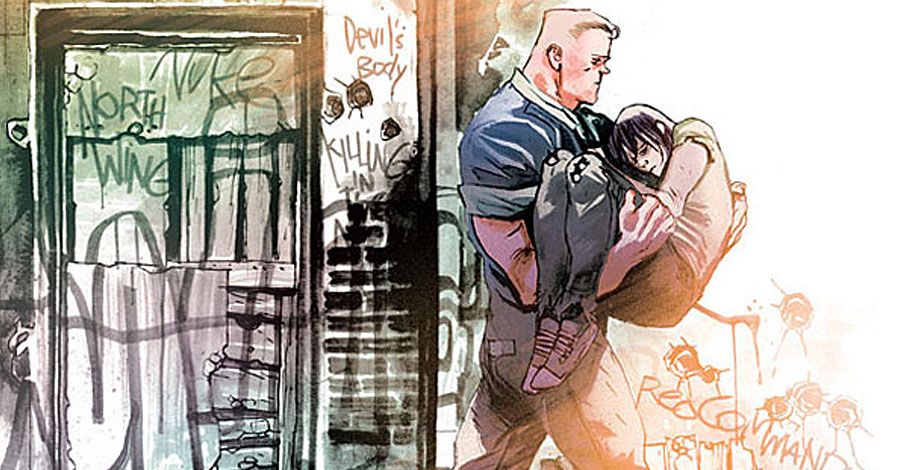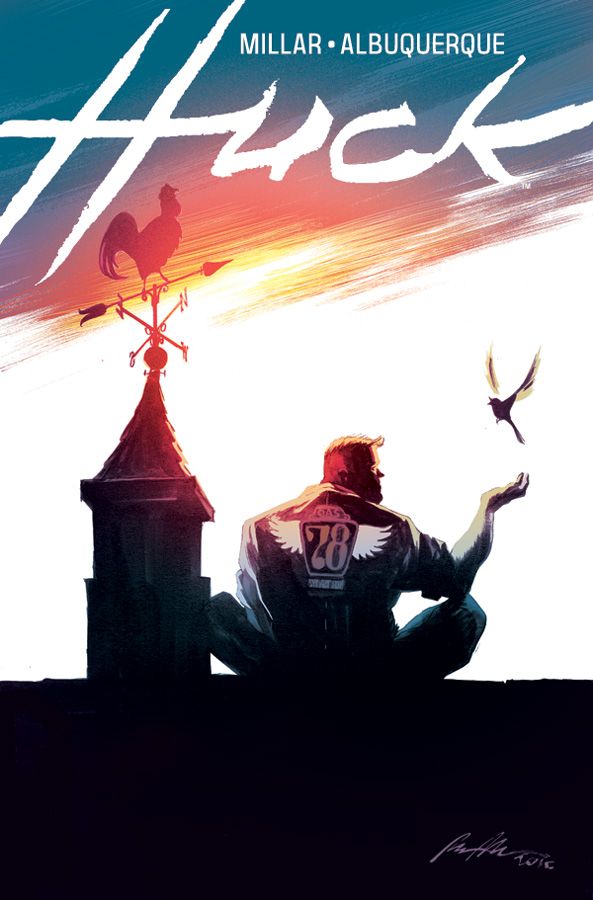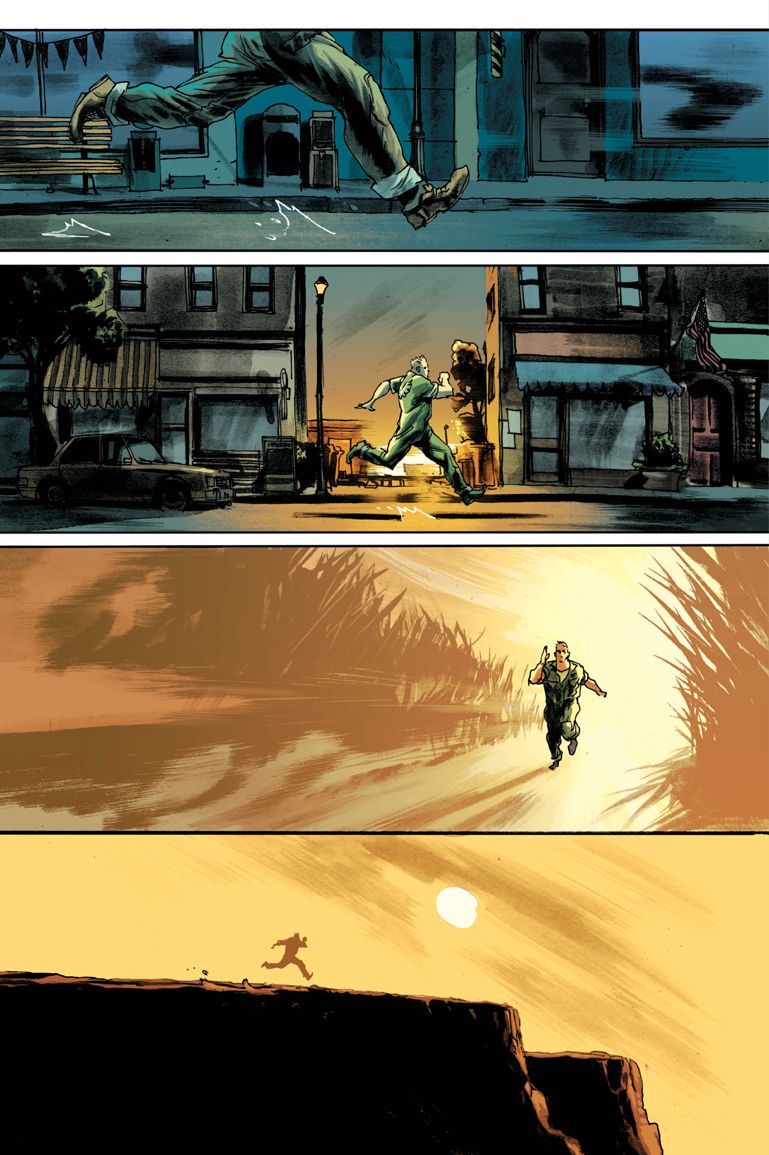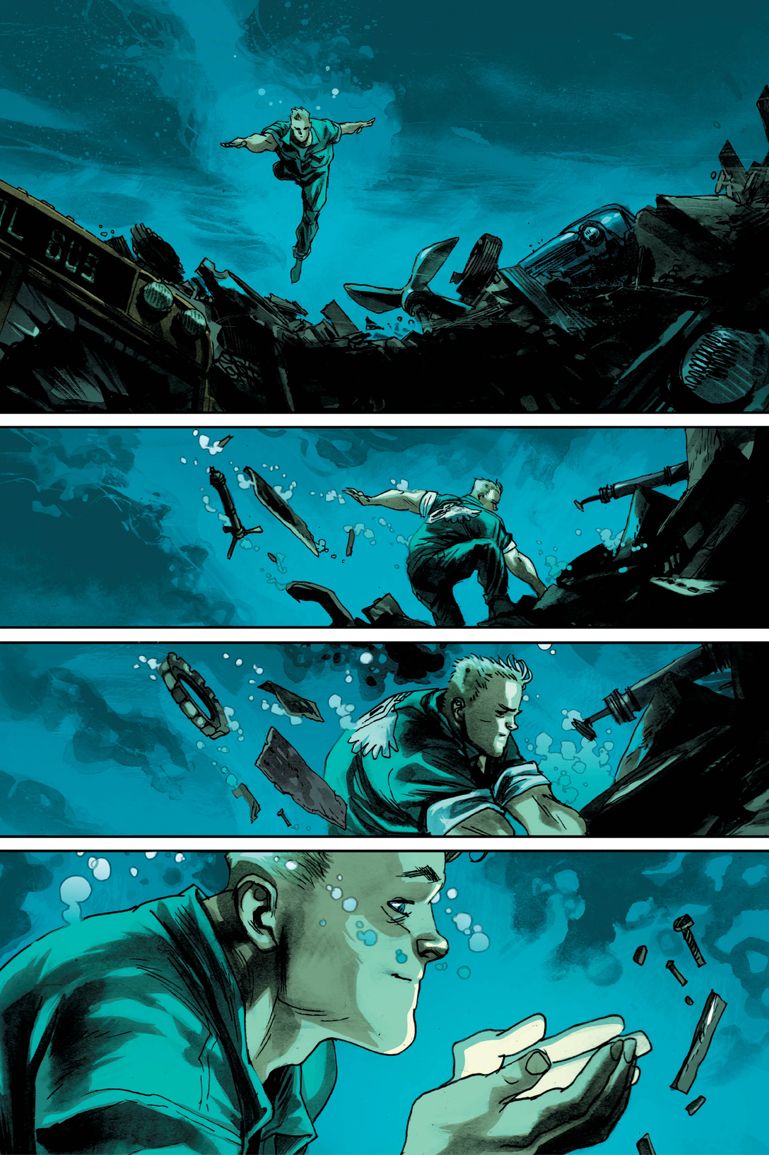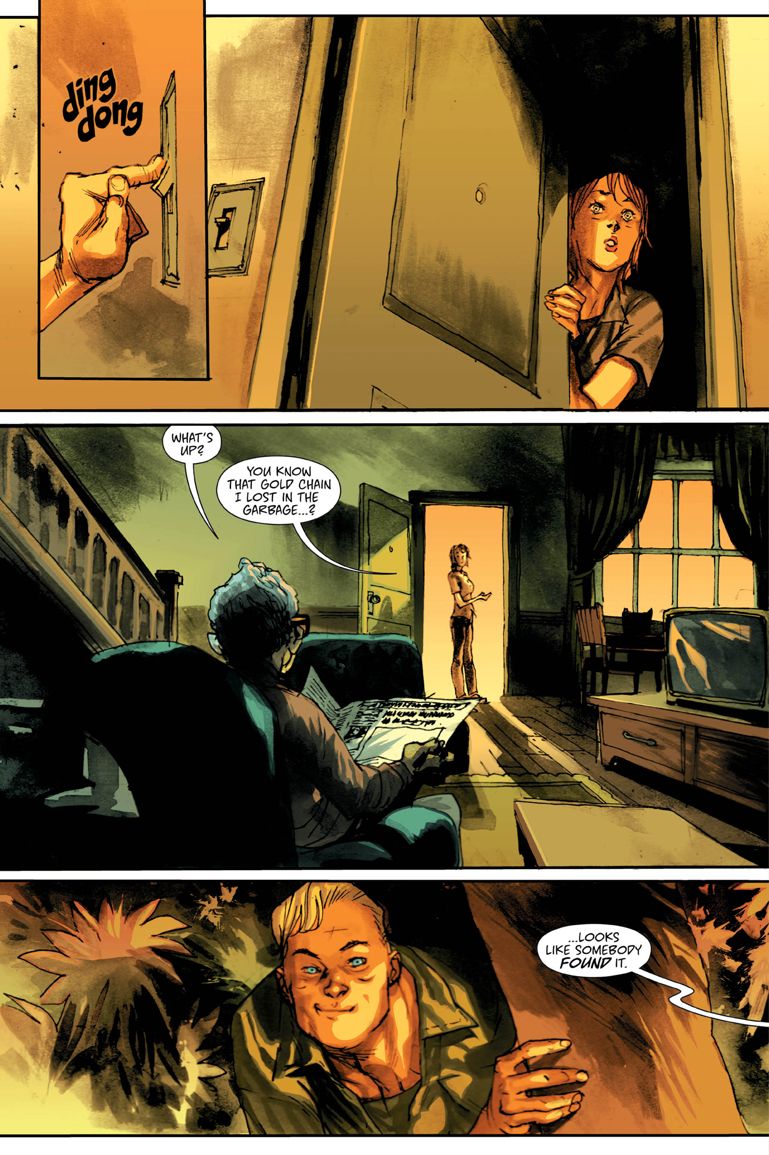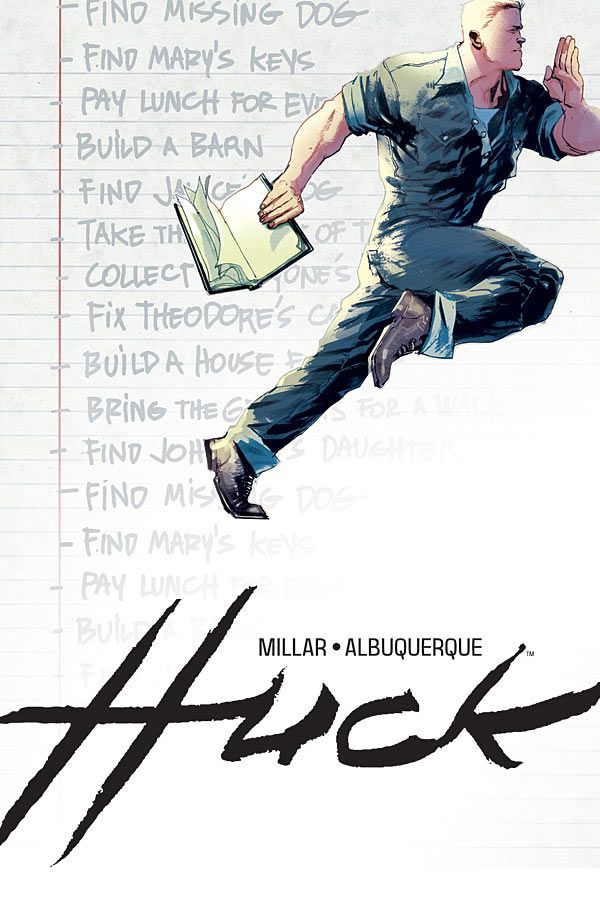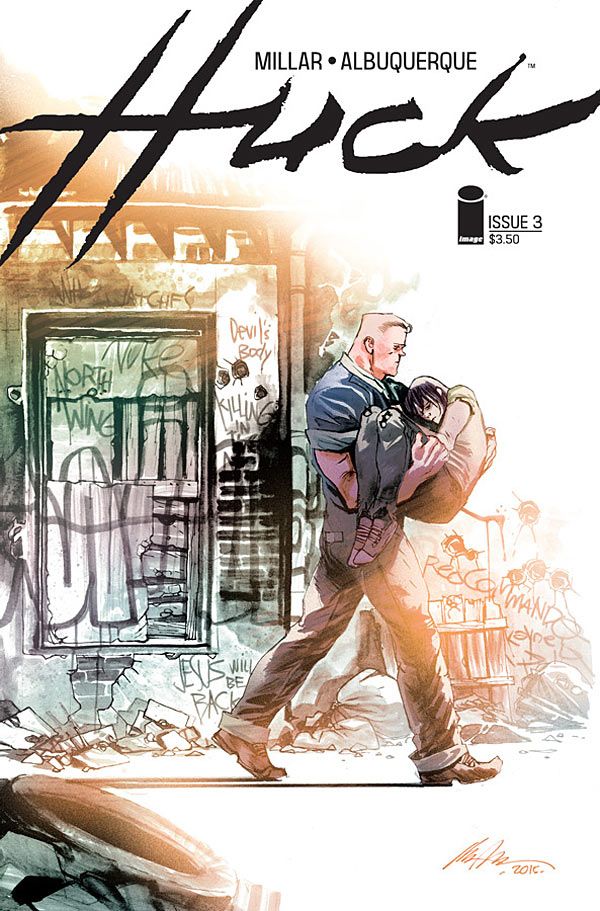Mark Millar may like America better than some of the country's own citizens, and all of his love for USA's heartland is being poured into his small town superhero epic "Huck."
Created with "American Vampire" artist Rafael Albuquerque, the November-launching Image Comics series centers on the title character, a hulking-yet-gentle man, whose magnificent powers make him the secret hero of a sleepy Midwestern town. But while the six-issue series appears to have much in common with Millar's previous Millarworld books -- from an A-list artist poached from the Big Two, to a Hollywood deal already set up before issue #1 arrives -- the writer promises "Huck" is a unique entry in his ever-growing comic book catalogue.
RELATED: Millarworld Expands in 2016, New "Hit-Girl," "Chrononauts 2" & More
Millar spoke with CBR about how "Huck" goes from the small story of a man who does good deeds to a massive super epic, all without donning capes and tights. He also explains why his first issue cliffhanger is the wave of the future for Millarworld and says that Channing Tatum is his dream star for the eventual big screen adaptation.
CBR News: Mark, you've said a chance encounter with a man who tried to do one good deed for someone else every day inspired you to create this character. I was wondering if you'd had a chance to find that man and tell him he inspired a comic book.
Mark Millar: No, weirdly. I met the guy when I was doing some volunteer stuff on a Friday. I do a few different things, and one of them is helping people make tea and things at this adult learning center, and one of the guys who was there was a guy from down South. When he was on holiday, he went to the connected version of the center he goes to down there. He just ended up coming to the center I help at. I chatted with him over five minutes, and within the next week, I kept thinking about this idea he told me where he does nice things for people.
I remember being so impressed by it that I thought, "That's kind of like a superhero." I'm always just reducing everything to superheroes in my mind. [Laughs] I just thought it was kind of sweet, but I've never seen him since. This must have happened last summer, and it just stuck with me. I began the project about six months later, around the beginning of this year, but I never saw him again. Maybe when the movie comes out, he'll recognize me.
He's kind of like Batman in that you turn around, and he's gone.
[Laughs] The funny thing is, I tried to do his mantra for a few weeks. Or probably a few days, really. I started out doing it, and then I just let it slip. It's so easy, and it just takes ten seconds, and yet you find yourself falling back into your usual selfish ways. But I was really impressed at the idea of doing little things, like picking up a chair for someone, or making a coffee or something. It's a nice mantra.
But how do you turn a concept like that, even with a superheroic character, into a story? We hear things these days about how, in Hollywood, they always want some kind of machine that's going to destroy the world because they want the stakes to be raised as high as they can be. Is it tough in that climate to make yourself tell a smaller story?
I'm a great fan of an easy entry point into big ideas. There is a great big idea behind this story, and some big moments in it. There's a lot of drama as well, even though it's sweet. But I always want to start in the beginning, with that first bit, and make it accessible as possible for readers. I write that way all the time, like in "Chrononauts," which started with the very simple idea of a jet plane being inside a thousand-year-old temple. That just seemed interesting, and it gets your mind working in a certain way.
In "Huck," we've got this guy with these amazing abilities who is like a town secret. That's an interesting, easy way into what's obviously a much larger story. It's all about where he came from, who he's a part of, and the question of, "Are they going to come back for him?" There is an antagonist as well, but I tried to do a superhero story that doesn't fall into the usual tropes. There's no costume. There's no capes. There are no codenames or anything like that. Even in a traditional sense, there's no supervillain. This is almost like a superhero comic if superhero comics had never been invented.
We talked recently, and you said that you always come up with an idea for a project and then go in search of an artist who's the best fit. Rafael Albuquerque seemed to connect to this because he has a kind of impressionistic quality to his art that maybe matches that small town quality more than other guys. How has his part in "Huck" helped it develop?
In my mind, this was kind of John Steinbeck's America -- even though it was a contemporary story. There's a kind of "guys in denim Dungarees" vibe about it. It's a small, Midwestern town where nobody's especially wealthy. It's the kind of America that has a classic decency to it, where hard work pays off. It's a lovely image of the America I grew up wanting there to be. I would sit in Scotland watching what America was like and thinking, "I want to live there when I'm older," even though that's a Hollywood, Frank Capra kind of ideal. But I think Rafa totally captures that. It's kind of odd to want to create an American myth when I'm Scottish and Rafa's Brazilian. [Laughs] But it works.
It still seems so odd to me how, from Alan Moore and Warren Ellis on down the line, there are so many comic writers from the UK who at various times have wanted to have their say on America as an idea. You guys like to tell stories in our country far more than we like to tell them in yours.
[Laughs] Totally. It's what we grew up with. When I was a kid and I was playing with my friends -- you know, when you're playing at being the Incredible Hulk or Knight Rider or something -- everyone did an American accent. It was really weird to have all these Scottish kids doing American accents, and now I hear my own kids doing it as I listen to them playing outside the window. It just seems glamorous. I know the UK probably doesn't seem especially glamorous to you guys. If Spielberg did, like, four or five movies in a row here, Scottish people would be astonished! But me doing four or five stories set in America in a row seems perfectly normal to us.
As you've written "Huck," have you gotten a different impression of America? I know you've been able to come here a lot, and not just go to LA but to do store signings in small towns and other gigs. Does that feed into what happens in "Huck"?
Kind of. You know what I really get from America? It's not conscious, but as I think of it now, the version of America that I grew up with was one where everybody was Bruce Wayne. Everybody was a billionaire. And the one thing I'm quite shocked by as I travel around is how there's not a lot of money out there -- especially in the Midwest. One of my friends told me that his local gas station closed down because so very few people were using it. That sense of decline was my biggest surprise.
I think there's something quite special about America -- and I know that some Americans will laugh when I say this -- but I think what it is that it's a nation full of optimists. Whether you're coming to America from Ireland or South America or wherever, you're coming in the hope of improving your life. I think that's in your DNA, several generations on. It's what makes Americans quite different from Brits, in particular. We take a much more pessimistic approach -- maybe because we lost our empire and America still kind of has its empire. But I think there's a definite psychological difference there, and I'm much more in tune with your side of it because I grew up reading comics and watching movies and things like that.
As is typical of a Mark Millar project, a "Huck" movie is already in its early stages. I know you've been talking about wanting Channing Tatum for the lead role. Is that just you goofing or are you actually working to make it happen?
We didn't make the movie public until about a month ago, but I wrote the comic after Christmastime last year. Then, by the time Easter came around, the movie deal was finished because I'd handed over all six [comic] scripts. The lesson I learned with "The Secret Service" was that you have to get these things rolling quickly, because after I'd done that comic, suddenly there were three other people going around Hollywood with the same kind of pitch, but passing it off as their own. Luckily, I had friends at the studios who tipped me off, and that's why Matthew Vaughn came off "X-Men" and got right into "Secret Service" before anyone else could do it.
So I always do this, and with the movie planning, I always try to have a writer or director in mind, and the same with casting. For me, I can't see anyone other than Channing Tatum. I was saying this in March, when we made the deal. You don't see many guys in Hollywood who are very big -- like physically big -- and very sweet who are also great actors. Channing Tatum just has that vibe about him. Then, weirdly, at Comic-Con [International] this summer, I saw the photo of him helping Stan Lee from the stage. I immediately e-mailed Jeff Robinov who runs the studio and said, "See? It's has to be Channing Tatum. Look at this. All the other actors are posing for photographs, and Channing runs off to help Stan Lee down the steps. He is Huck!" So we'll see what happens. I'm hopeful.
Your schedule over the past few years has been one where you're finishing almost the entire book, art and all, before your new books ship. Is it strange to be talking about this book now, when you finished your part of it almost a year ago?
It is kind of weird! It was genuinely snowing when I wrote it, and by the time I was done with it, I was eating a chocolate Easter Egg. It's not like doing comics normally. Usually, you're doing things by the skin of your teeth, where you're sending ten pages to the artist at a time, and then it's out a few months later. It's weird to be talking about it now, because my mind is on the big project that's coming next, that I'm writing at the moment. But it's nice, because it's a book I'm happy with. There's nothing worse than promoting something you hate because you think you did a really bad job on it. But with "Huck," I'm really pleased with how it turned out. I hope other people like it as much as I do.
Some of your other projects are ones where once you hear the pitch, you know some of what's coming, and the anticipation readers have is in seeing the details you bring to the story. This one seems more like a mystery in terms of how it will play out on the page.
[Laughs] Hopefully it'll be a good time. It takes some unusual turns. I tried to do a really good cliffhanger at the end of the first issue where you go, "What?!?" I've been trying to do that with a few of my projects lately. Generally, we still write for the trade, and we've all been doing that for the last 15 years since trade programs got good. You always tend to just break the story at page 22 of your six-issue storyline. But I want to do things now, with really good cliffhangers. I like the idea of driving you insane for four weeks as you try to figure out what happens next, or how they'll get out of this. It's almost something we've forgotten in comics.
"Huck" #1 arrives November 18 from Image Comics.

